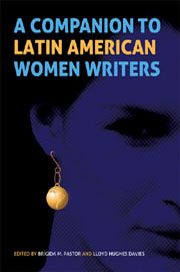Book contents
- Frontmatter
- Contents
- Introduction: The Feminine Voice in Latin American Literature
- 1 Sor Juana Inés de la Cruz (1648/51?–1695)
- 2 Gertrudis Gómez de Avellaneda (1814–1873)
- 3 Gabriela Mistral (1889–1957)
- 4 Alfonsina Storni (1892–1938)
- 5 Silvina Ocampo (1903–1993)
- 6 Clarice Lispector (1920–1977)
- 7 Rosario Castellanos (1925–1974)
- 8 Elena Poniatowska (1933– )
- 9 Alejandra Pizarnik (1936–1972)
- 10 Luisa Valenzuela (1938– )
- 11 Isabel Allende (1942– )
- 12 Rosario Ferré (1938– )
- 13 Laura Esquivel (1950– )
- 14 Laura Restrepo (1950– )
- Conclusion
- Bibliography
- Index
10 - Luisa Valenzuela (1938– )
Published online by Cambridge University Press: 05 February 2013
- Frontmatter
- Contents
- Introduction: The Feminine Voice in Latin American Literature
- 1 Sor Juana Inés de la Cruz (1648/51?–1695)
- 2 Gertrudis Gómez de Avellaneda (1814–1873)
- 3 Gabriela Mistral (1889–1957)
- 4 Alfonsina Storni (1892–1938)
- 5 Silvina Ocampo (1903–1993)
- 6 Clarice Lispector (1920–1977)
- 7 Rosario Castellanos (1925–1974)
- 8 Elena Poniatowska (1933– )
- 9 Alejandra Pizarnik (1936–1972)
- 10 Luisa Valenzuela (1938– )
- 11 Isabel Allende (1942– )
- 12 Rosario Ferré (1938– )
- 13 Laura Esquivel (1950– )
- 14 Laura Restrepo (1950– )
- Conclusion
- Bibliography
- Index
Summary
Western society has long accepted the notion that in the beginning was the word: when God said let there be light, there was light, that is, saying it makes it so. Argentine Luisa Valenzuela has challenged this premise from the beginning of her literary career and inspired her readers to rethink the stories and versions of reality that have been promulgated by the powers that be on all levels of society. As her fiction repeatedly demonstrates, human beings continually try to repeat that initial divine gesture and perform their own acts of prestidigitation as they attempt to (re-)create the world in a way that would ensure their own supremacy, but the worlds they create ultimately exist only in words. What one says does not necessarily produce ‘light’; on the contrary, words often muddle or veil ‘reality’ or ‘truth’. Still, having been taught from an early age, by authorities on any number of levels, to accept their words without reservation, we often fail to question what we have been told and as a result lose sight of the vested nature of the versions of reality we have internalized. It is precisely these vested versions that Valenzuela contests time and again in her narrative. Nonetheless, unlike other author[ity] figures, Valenzuela never presumes to enlighten us with her ‘truth’ and steadfastly refuses to provide one more authoritative version of the world. Instead, her works are characterized by a search for truth (both inside and outside the text), while the results of that search are inevitably left to the interpretation of the reader.
- Type
- Chapter
- Information
- A Companion to Latin American Women Writers , pp. 149 - 158Publisher: Boydell & BrewerPrint publication year: 2012



